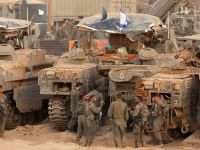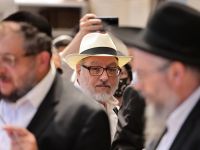A party drawn from Algeria's minority Berber community, the Rally for Culture and Democracy (RCD), quit the government Tuesday in protest at a bloody police crackdown on demonstrators in the Kabylie region.
The interior ministry meanwhile issued a statement saying 42 people had been killed and 572 injured in riots that erupted in the northeastern Berber heartland on April 18, after police shot dead a youth in custody.
Witnesses and press reports have put the death toll in the violence at up to 80. The rioting was the worst to hit Algeria since protests in October 1988 put an end to the single-party rule of the National Liberation Front (FLN).
The main Kabylie towns, Tizi Ouzou and Bejaia, were quiet Tuesday after serious weekend clashes and sporadic incidents on Monday, but people expressed disappointment over a broadcast by President Abdelaziz Bouteflika, who promised to set up a commission.
"The president said nothing of any interest to us," one Tizi Ouzou resident told AFP, while others in Bejaia described Bouteflika's speech to the nation on Monday night as "useless" and "beside the point".
Speaking after a meeting of RDC leaders, party head Said Sadi said Tuesday the bloodshed in Kabylie was "a tragedy", adding that "security forces never stopped firing real bullets at demonstrators."
Sadi said the RCD's two ministers -- Public Works Minister Amara Benyounes and Transport Minster Hamid Lounaouci -- had walked out of Prime Minister Ali Benflis's coalition.
"A government that fires on the people does not deserve to be supported and should not receive backing from democrats," Sadi, a well-known human rights activist, had said Sunday.
Before the interior ministry issued new figures Tuesday, the authorities had accepted responsibility for killing 16 protestors and injuring dozens of others.
According to the latest official toll, 388 members of the security forces were among those hurt in the violence, while one paramilitary riot policeman was killed.
Bouteflika promised "dialogue and tolerance" and a "totally free and transparent" civilian probe into the clashes, but several inhabitants of Bejaia, 250 kilometers (150 miles) east of Algiers, dismissed this proposal as "useless."
"No commission of inquiry has ever succeeded in Algeria. That is not what will produce results," one resident told AFP.
The Berbers have longstanding grievances over Muslim fundamentalists, cultural discrimination, unemployment and overcrowding.
Their impoverished, mountainous region is traditionally a hotbed of opposition in Algeria, which is already reeling from nearly a decade of civil war launched by Islamic extremists.
The Berbers, an indigenous people in north Africa who prefer to call themselves the Imazighen, make up about a third of the population, and many resent the imposition of the Arabic language and culture.
Bouteflika said he understood the Berbers' "impatience and frustration" and was at pains to stress that Berber, Arab and Islamic culture were enshrined in the constitution as the three fundamental elements of Algerian identity.
Demands for further cultural recognition would require changes to that constitution, he said.
The exiled leader of the opposition Socialist Forces Front (FFS), Hocine Ait-Ahmed, said Monday that protests had become more radical because of "the absence of political life in Algeria and the quashing of public freedoms."
Speaking from Switzerland, he warned that the Bouteflika government could try to discredit the Berber cause to fend off international criticism.
In a separate incident linked to the ongoing violence elsewhere, security services said 10 people were massacred on Monday night by Muslim fundamentalists at Chiffa near the garrison town of Blida, some 50 kilometres (30 miles) south of Algiers. They declined to give details.
A spate of renewed attacks on civilians around Blida in March was blamed by the authorities on hard-liners of the Armed Islamic Group (GIA), who rejected an amnesty and reconciliation offer extended by Bouteflika in 1999.
Algeria has been in the throes of insurgency since 1992, when the army prevented the now-outlawed fundamentalist Islamic Salvation Front (FIS) from taking power by calling off a second round of general elections.
The bloodshed has since claimed more than 100,000 lives, most of them civilians – ALGIERS (AFP)
© 2001 Al Bawaba (www.albawaba.com)







